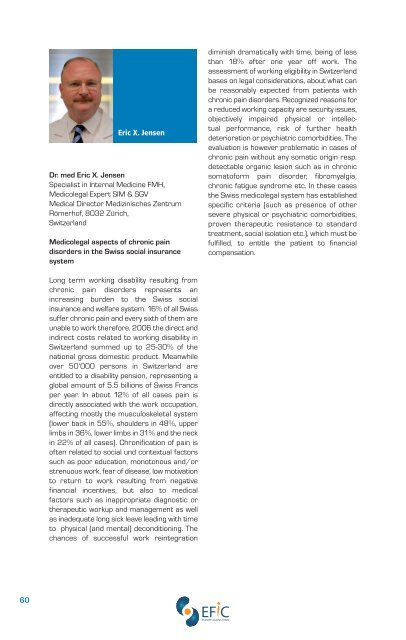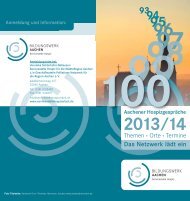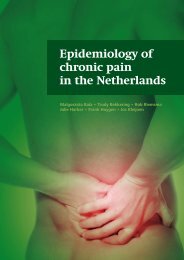First EFIC® Symposium Societal Impact of Pain - SIP
First EFIC® Symposium Societal Impact of Pain - SIP
First EFIC® Symposium Societal Impact of Pain - SIP
You also want an ePaper? Increase the reach of your titles
YUMPU automatically turns print PDFs into web optimized ePapers that Google loves.
60<br />
Eric X. Jensen<br />
Dr. med Eric X. Jensen<br />
Specialist in Internal Medicine FMH,<br />
Medicolegal Expert SIM & SGV<br />
Medical Director Medizinisches Zentrum<br />
Römerh<strong>of</strong>, 8032 Zürich,<br />
Switzerland<br />
Medicolegal aspects <strong>of</strong> chronic pain<br />
disorders in the Swiss social insurance<br />
system<br />
Long term working disability resulting from<br />
chronic pain disorders represents an<br />
increasing burden to the Swiss social<br />
insurance and welfare system. 16% <strong>of</strong> all Swiss<br />
suffer chronic pain and every sixth <strong>of</strong> them are<br />
unable to work therefore. 2006 the direct and<br />
indirect costs related to working disability in<br />
Switzerland summed up to 25-30% <strong>of</strong> the<br />
national gross domestic product. Meanwhile<br />
over 50’000 persons in Switzerland are<br />
entitled to a disability pension, representing a<br />
global amount <strong>of</strong> 5.5 billions <strong>of</strong> Swiss Francs<br />
per year. In about 12% <strong>of</strong> all cases pain is<br />
directly associated with the work occupation,<br />
affecting mostly the musculoskeletal system<br />
(lower back in 55%, shoulders in 48%, upper<br />
limbs in 36%, lower limbs in 31% and the neck<br />
in 22% <strong>of</strong> all cases). Chronification <strong>of</strong> pain is<br />
<strong>of</strong>ten related to social und contextual factors<br />
such as poor education, monotonous and/or<br />
strenuous work, fear <strong>of</strong> disease, low motivation<br />
to return to work resulting from negative<br />
financial incentives, but also to medical<br />
factors such as inappropriate diagnostic or<br />
therapeutic workup and management as well<br />
as inadequate long sick leave leading with time<br />
to physical (and mental) deconditioning. The<br />
chances <strong>of</strong> successful work reintegration<br />
diminish dramatically with time, being <strong>of</strong> less<br />
than 18% after one year <strong>of</strong>f work. The<br />
assessment <strong>of</strong> working eligibility in Switzerland<br />
bases on legal considerations, about what can<br />
be reasonably expected from patients with<br />
chronic pain disorders. Recognized reasons for<br />
a reduced working capacity are security issues,<br />
objectively impaired physical or intellectual<br />
performance, risk <strong>of</strong> further health<br />
deterioration or psychiatric comorbidities. The<br />
evaluation is however problematic in cases <strong>of</strong><br />
chronic pain without any somatic origin resp.<br />
detectable organic lesion such as in chronic<br />
somat<strong>of</strong>orm pain disorder, fibromyalgia,<br />
chronic fatigue syndrome etc. In these cases<br />
the Swiss medicolegal system has established<br />
specific criteria (such as presence <strong>of</strong> other<br />
severe physical or psychiatric comorbidities,<br />
proven therapeutic resistance to standard<br />
treatment, social isolation etc.), which must be<br />
fulfilled, to entitle the patient to financial<br />
compensation.






